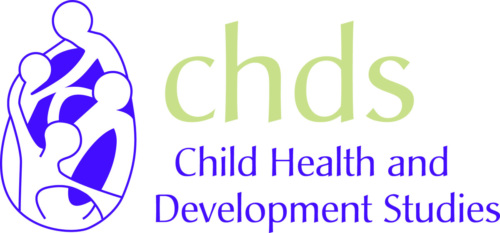
Child Health and Development Studies

The Child Health and Development Studies (CHDS) investigates how health and disease are passed on between generations—not only genetically, but also through social, personal, and environmental surroundings. Studies spanning over 60 years enable CHDS scientists to study health across generations and seek ways to prevent disease early in life.
-
Focus Areas
Chronic Disease Prevention, Environmental Health, Women, Youth & Children -
Issues
Cancer, Heart Disease, Reproductive & Sexual Health -
Expertise
Research – Quantitative, Research – Surveillance -
Strategic Initiatives
COVID-19, Vaccine Access & Equity
Our Impact
See all Child Health and Development Studies Impacts

- 6M newborns each year given the best start before birth
- 300K female cardiovascular disease deaths a year create chances for early prevention
- 80K environmental chemicals leading to discoveries in evidence for policy
Projects
Active Projects
- Prenatal Factors and Risk of Bipolar Disorder
-
This study examines the relationship between early developmental insults and risk of adult bipolar affective disorder. Investigators aim to better understand early developmental risk factors for bipolar disorder, and assess whether these factors are specific to schizophrenia. This project is a collaboration with the Research Foundation for Mental Hygiene.
- Prenatal Determinants of Schizophrenia, II
-
This study investigates the role of prenatal determinants of schizophrenia and schizophrenia spectrum disorder.The study builds on and extends two prior investigations: the original Child Health and Development Study and the Prenatal Determinants of Schizophrenia Study, This project is a collaboration with Kaiser Foundation Research Institute.
- Early Determinants of Mammographic Density
-
The purpose of this study by the Child Health and Development Studies, Kaiser Permanente and Columbia University is to learn more about the effects of the prenatal period and early childhood on women's adult health, particularly the health of their breasts. It examines whether mammographic density (which may be linked to later risk of breast cancer) is related to prenatal or early childhood factors.
Completed Projects
- Environmental Causes of Breast Cancer Across Generations
-
This study tests the idea that prenatal exposure to environmental chemicals increases the risk of breast cancer. Many of these compounds are known to affect fertility, birth outcomes, and immune function and are thus suspected causes of or contributors to breast cancer. However, no human study has been able to measure exposure in the womb, a time of vulnerability for the developing fetus.
- A Lifecourse Approach to Emerging Health Disparities in a U.S. Cohort
-
This study, sponsored by the National Institute of Child Health and Development, was a collaboration between CHDS investigators and Columbia University. The focus of this project is to understand how and when racial and socioeconomic disparities in health emerge over the life course. It will provide critical information for understanding why disparities exist and how they might be addressed.
- Prenatal Organochlorines, Thyroid, and Development
-
This project assessed whether exposure to endocrine disrupting compounds during pregnancy is associated with a) adverse development (cognitive function, height, weight, weight for height, and for females, age at menarche) in the offspring at birth, early childhood, middle childhood, and adolescence, b) mild deficiencies in maternal thyroid function, and c) whether adverse developmental findings, if any, are attributed in part to deficiencies in exposure to maternal thyroid hormone in utero.
- In Utero Organochlorine Exposure and Breast Density
-
This project tests the hypothesis that in-utero exposure to organochlorine compounds alters breast density in women measured at 40-44 years of age. High breast density is associated with increased risk of breast cancer.
- Early Determinants of Adult Health
-
This collaborative project between Child Health and Development Studies (CHDS) investigators and Columbia University, Harvard University, the University of California, Davis, and the Kaiser Permanente Division of Research examines how prenatal and childhood factors influence the risk for diabetes, heart disease, breast cancer and brain function in adulthood. This project launched a new era of research at the CHDS focused on adult health of CHDS "children."
- Prenatal Organochlorine Exposure and Male Reproduction (Study of the Environment and Reproduction)
-
The Study of the Environment and Reproduction is a joint project between the Child Health and Development Studies,Kaiser Permanente and Columbia University. It examines the effects of prenatal exposure to pesticides and men's fertility. Prenatal exposure to pesticides could occur if a man's mother was exposed to pesticides before or during her pregnancy. Some pesticides are stored for long periods in body tissues and might affect the developing reproductive system of a fetus.
- Maintenance of Child Health and Development Studies Name and Address Files
-
The project's general aims are: 1) to maintain the accuracy of the Child Health and Development Studies (CHDS) files for name and addresses, mortality and occurrences of malignancies; 2) to manage the CHDS serum collection; and 3) to facilitate the biomedical and psychosocial studies through dissemination of data to qualified researchers without violating participant confidentiality.
- Fetal Exposure to Maternal Stress and Inflammation: Effects on Neurodevelopment
-
In partnership with Temple University, this project aims to investigate how maternal stress and maternal inflammation during pregnancy, and fetal hypoxia in the CHDS mothers influence the risk of symptoms of depression during adolescence in offspring (CHDS children).
- Prenatal Organochlorine Exposure and Human Reproduction
-
This pilot study collected semen samples from CHDS sons as preparation for a proposal to fund an examination of the relationship between prenatal exposure to organochlorines and semen quality.
- Tobacco Smoke Exposure and Atrial Fibrilation
-
The purpose of this study is to simultaneously combat two of the most important threats to health and wellness today: atrial fibrillation (AF) and tobacco smoke exposure. We will leverage the multi-generational nature of the Childhood Health and Development Study to test the hypothesis that exposure to tobacco smoke during early development leads to AF in adulthood and to evaluate whether individual-level adult tobacco smoke exposure is correlated with discrete episodes of atrial arrhythmias.
- Stress, Epigentics, and Aging
-
This study examines the role of childhood and adult socioeconomic status (SES) and psychosocial stressors on telomere length and methylation age in adulthood; behavioral and psychological responses to stress as potential mediators of these associations, and positive and negative coping factors as potential modifiers.
- Immune Markers in Pregnancy and Breast Cancer
-
This project examined clinically observed indicators of placental function as prospective predictors of maternal breast cancer.
- Prenatal Environmental Determinants of Intergenerational Risk (PEDIGREE)
-
This is a unique study of human exposure to endocrine active environmental chemicals during two critical windows of exposure for the breast: 1) pregnancy which places the breast at risk for carcinogenesis in the mother and 2) the prenatal period when breast differentiation places the breast at risk for carcinogenesis in the daughter. We are investigating how history of maternal breast cancer modifies F0 environmental exposure effects on mammographic density and Line-1 DNA methylation in the F1.
- Prenatal Exposure to Environmental DDT and Risk of Metabolic Syndrome
-
In partnership with the University of California, Davis, we will investigate, for the first time, maternal exposures to endocrine-active compounds in relation to biomarkers of metabolic disruption, including hemoglobin A1-C a marker of diabetes.
- Identification of Spectrum Neurodevelopmental Sequelae in CHDS Cohort
-
In this pilot study, CHDS will identify cases of spectrum of neurodevelopmental sequelae including ADD, ADHD, learning disabilities, sensory processing disorders, mental illness, emotional disturbance, social cognitive deficits, and autism spectrum disorder in the CHDS cohort grandchildren. This study prepares for the first three generation study of autism in relation to CHDS mothers exposures.
- The Epidemiology of Growth Factors and Immune Function in Pregnancy: Relation to Maternal Breast Cancer
-
The project investigated the relation between prospectively obtained measures of serum markers of placental function in pregnancy and breast cancer.
- Prenatal Exposure to Organochlorines and Fecundability
-
A prospective study to investigate the relation between prenatal exposure to environmental chemicals and fecundability (time to pregnancy) in adult CHDS daughters.
- Linking Neighborhood and Individual ACEs to Breast Cancer
-
We will examine adverse experiences in childhood (ACEs) measured at the neighborhood and individual level over the course of childhood and construct pathways to risk of breast cancer (age at menarche, breast density) from infancy through adolescence, correlated with characteristics of place of residence. Focusing on neighborhood level ACEs will allow us to apply what we have learned to create a California map to identify current childhood populations at risk.
- Chemical Safety During Breast Cancer Susceptibility Windows
-
Development of chemical testing that interrogates effects on high impact pathways in humans is likely to be most effective for identifying and controlling dangerous exposures. This project planned to discover some of these pathways for pregnancy and in utero windows of susceptibility by implementing metabolomics in the CHDS, including the first investigation of paternal contributions to daughter's breast cancer.
- Early Life Exposures and Risk of Young-Onset Colorectal Cancer
-
The incidence of colorectal cancer (CRC) has nearly doubled among younger adults (age <50 years) since the early 1990s. Factors contributing to rising incidence rates have puzzled researchers for years, and family history remains the only known risk factor. This project will evaluate the role of early life exposures in understanding increased risk of young-onset colorectal cancer and characterize family history and germline mutations in young-onset CRC.
- Finding Metabolic Signatures in Pregnancy that Predict Breast Cancer: 60-Year Prospective Study in the CHDS Pregnancy Cohort
-
In partnership with Emory University, this project studies second and third trimester archival samples of women who subsequently developed breast cancer, compared to second and third trimester archival samples from women who did not develop breast cancer, to identify predictive gestational biomarkers which could lead to new approaches to prevent breast cancer.
- Prostate Cancer: Prospective Serum Markers in Blacks and Whites
-
The project examined the possible relationship of genetics and serum levels of androgens and growth factors to the risk of prostate cancer in African-American and Caucasian men.
- Estriol, Blood Flow, and Breast Cancer Risk
-
This study proposed that estriol released from the placenta directly into the uterine vasculature likely explains the fifteen- to twenty-fold increase in uterine blood flow that occurs during human pregnancy. Lifelong residual vascular effects that enhance clearance of genotoxic and other noxious substances from the breasts may explain the protective effect of pregnancy against breast cancer.
- Exposure to DDT, DDE and PCBs Before Birth and Human Testicular Cancer: A Prospective Study Based on Archived Pregnancy Samples
-
Testicular cancer incidence arose dramatically worldwide among men born after 1945. The widespread introduction of DDT may have contributed to this increase. This study investigates whether in utero exposure to DDT, DDE, or congener-specific PCBs increase the risk of testicular cancer.
- Breast Cancer and Organochlorines
-
This project considered timing of exposure in a prospective epidemiological study of the relationship between DDT exposure and breast cancer.
- Celiac Disease Within a Multi-Generational Cohort Study
-
The goal of this project is to provide information about the consequences of untreated celiac disease, increase awareness of the disease and potentially provide evidence of the importance of screening children and young adults, reducing the disease’s impact on multiple generations.
- Reporting Personal Levels of Environmental Chemicals: Impact
-
The first study of its kind, this project will test the hypothesis that personal report-back will increase participant's commitment to research, knowledge about environmental chemicals, and motivate personal and community-level action to reduce exposures; and that personal report-back will motivate women who are often asked for health advice to discuss environmental chemical exposures with their broad networks, spreading the message.
- Maternal Inflammation During Pregnancy: Clinical and Neurocognitive Outcomes in Adult Offspring
-
This study is a partnership with the University of California, Berkeley (UCB) and Temple University. The purpose of the study is to look at what influences brain health throughout development, including early life and prenatal development, and will help us understand how early experiences influence brain development in adulthood. The unique and valuable information this study provides will be used for research that will help us understand brain health, including depression and anxiety.
- Grandparental Exposures and Risk of Autism in the Third Generation
-
This proposal looks for environmental risk factors for autism during the critical period of susceptibility, in the womb. In this study we ask whether specific exposures during the 1960s to grandfathers and grandmothers during conception and pregnancy are linked to autism in their grandchildren. No study has been able to ask this question before now.
- Germline EDC Exposure and Breast Cancer Risk in the 3Gs Study
-
Pregnancy exposures impact three generations simultaneously: 1) the mother, 2) the fetus, and 3) the reproductive cells (germline) that will form the grandchild. These are windows of susceptibility of the breast to endocrine disrupting chemicals, EDCs. We are investigating the impact of germline exposure to EDCs on breast cancer risk factors and the effect of race and socioeconomic status (SES) on that relationship. We will develop a health communication campaign aimed at reducing EDC exposures.
- Rethink Plastic
-
The goal of this pilot study is to design a social network intervention to reduce plastic use in families with children and adolescents. Plastics were chosen because they are common sources of environmental estrogens, a possible risk factor for breast cancer. As a Community Research Collaboration pilot study CHDS researchers will be joined two community partners: the Participant Advisory Council of the CHDS and the Plastics Pollution Coalition.
- New Bone-Age Assessment Technique for Cancer Epidemiology
-
This project developed computer-assisted bone age scoring of wrist radiographs in collaboration with Harvard Medical School to facilitate studies of the relation of early life factors to cancer.
- Can Placenta Factors Explain Race Patterns of Breast Cancer?
-
Higher birth weights have been reported to increase breast cancer risk, and birth weights of mothers and daughters are highly correlated. However, race/ethnicity patterns for birth weight do not match patterns of breast cancer in California (lowest in Asians and Hispanics). A key to progress in breast cancer prevention will lie in reconciling critical paradoxes like this one. This grant examines whether race differences in placental characteristics shed light on this paradox.
- Pregnancy Hormones, Environment, Genes, and Offspring Health
-
This planning grant tested the feasibility of creating a genetic library for the CHDS that can be used to understand how genes interact with environment to influence health of parents and offspring. It included intensive examination of the ethics of genetic studies in long-term studies.
Work With Us
You change the world. We do the rest. Explore fiscal sponsorship at PHI.
Support Us
Together, we can accelerate our response to public health’s most critical issues.
Find Employment
Begin your career at the Public Health Institute.













